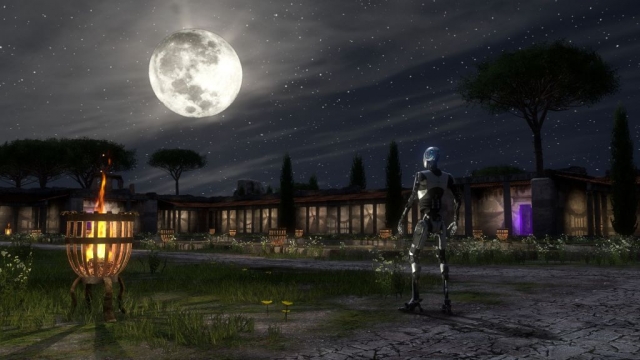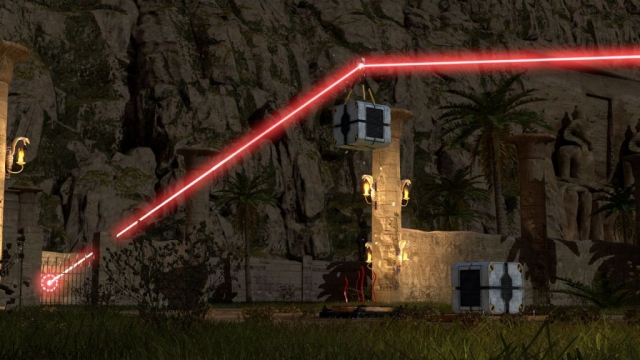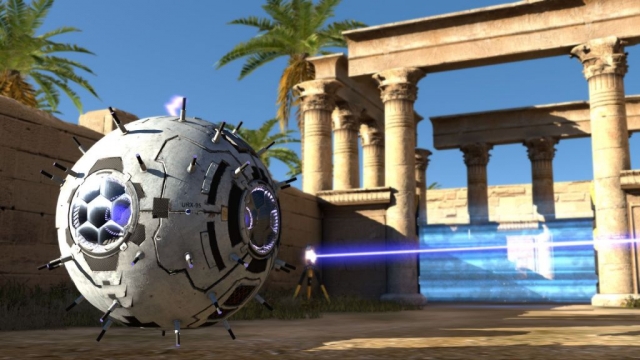The Talos Principle: Deluxe Edition

As most people said upon its PC release back in January, The Talos Principle is statistically bizarre. Croteam is known for the Serious Sam series, which are an exercise in seeing how many hostile aliens can be fit into a first-person shooter map. Their side project turned out to be a comparatively slow-paced puzzle game, set inside a decaying virtual environment presided over by a half-crazy, disembodied voice who could actually be God, and dealing explicitly with themes of what it means to be human and how we as a species would deal with the knowledge of imminent extinction. Its existence was the first surprise, and it being pretty decent was the second.
I’d been meaning to play it for months, since manic exploration and weird philosophical tangents are kind of my collective jam, and the PS4 release was a good excuse. It’s an example of doing as much as possible with relatively limited tools, as the game is built in the same engine as Serious Sam with what may very well be recycled assets, and the items and features you use to solve puzzles are relatively common throughout the genre. You have a copyright-friendly Weighted Companion Cube, a diamond-tipped tripod that can be used to redirect beams of light to receivers that power local machinery, a gadget that lets you jam and deactivate machinery, an assortment of high-powered fans, and other instantly familiar features.
The big innovation here is that Talos Principle is bigger and faster than most other puzzle games I’ve ever played. You can run like a gazelle in this game, and the stages are absolutely enormous, giving you plenty of room to explore while limiting your surroundings a bit during the actual puzzles. The plot isn’t spoon-fed to you, and getting even a vague idea of what’s actually happening requires you to put two and two together from old corrupt computer archives and the odd audio time capsule.
It’s not without some missteps. One of the tools lets you record your actions and play them back later, creating a short-lived duplicate of yourself that you can interact with. Most of the playback solutions involve standing around somewhere for a few minutes to give yourself time to work, which is dull and kills a lot of the game’s momentum. There are also several features that the game flat-out never tells you about, such as the ability to drop cubes on top of certain hazards in order to turn them into makeshift traversable platforms. It’s a great feeling when you manage to figure this out regardless, but it still feels as if you’re being punished for not having access to the game’s invisible rulebook.
Talos Principle also features a lot of Croteam’s trademark approach to hiding secrets, where you’d have to be clairvoyant or exhaustively thorough to have any hope of finding certain things. One early secret involves using an augmented-reality reader on your television screen, then decoding the resulting message; another one rides on a hidden switch in an obscure corner of the map; several more require you to set up features of one puzzle so that they can be seen and interacted with from outside it. I’m not sure how anyone would find several of them if they were simply going about the game on their own.
Finally, a few different “puzzles” are less about being smart or clever and more about your twitch reflexes, as you’re mostly playing intricate games of tag with a series of self-propelled land mines. It’s an unfortunate departure from the rest of the game, and seems like a general misstep. 90% of Talos Principle is a thoughtful mind-bender of a game that you could safely recommend to older relatives or non-gamers, but that last 10% will be a problem.
The PlayStation 4 package includes the game’s DLC, “The Road to Gehenna,” a four-level, sixteen-puzzle expansion that’s set after the main game’s best ending. The basic ideas are the same, except now you’re rescuing a series of robots who are trapped inside the puzzles, and the difficulty curve is far higher. It’s aimed at people who’ve mastered the original game, and has some truly clever writing scattered throughout, including a series of loving parodies of BBS culture, fanfiction, and online communities.
“Road to Gehenna” is almost too big for its own good, however. Several of the puzzles are set within areas the size of an entire hub zone in the first game, which can turn a relatively straightforward solution into an eye-straining pixel hunt. I’d go so far as to say that if you’re not playing on a large TV in the highest resolution you can manage, “The Road to Gehenna” is virtually impossible.
The whole package, as long as you resist the urge to search for puzzle solutions, is probably worth the fifty bucks that Devolver is asking for it. The base game is surprisingly long, and it took me the better part of thirty hours to plow through it all. It’s one of the more surprising, thoughtful games to come out this year, and while there are several half-baked puzzles, it’s still a clever and memorable experience.
Reviewed By: Thomas Wilde
Publisher: Nighthawk Interactive / Devolver
Rating: 80%
——————————————————————————–
This review is based on a digital copy of The Talos Principle: Deluxe Edition for the PlayStation 4 provided by Nighthawk Interactive.
 Game Over Online
Game Over Online











